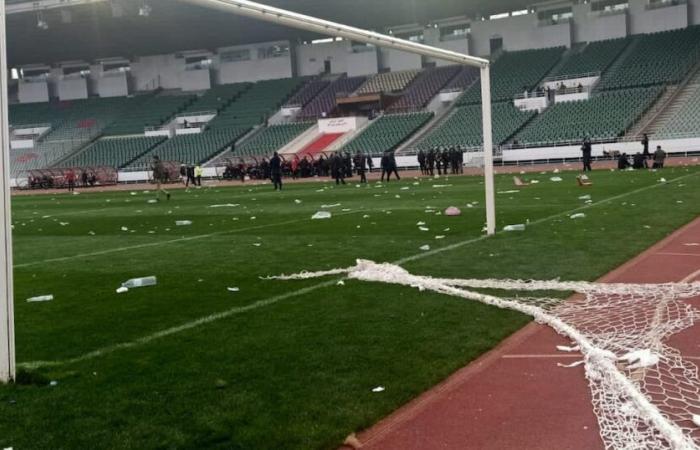
In Morocco, two feelings coexist among Football supporters and fans. On the one hand, a feeling of pride in the performances of the national teams, all categories combined. On the other, a frustration linked to the obligation, albeit temporary, to travel to attend the matches of your favorite team, at home or away, for security reasons and to avoid violence.
Fortunately, not all teams are affected!
We may remember the feat of the national team in Qatar in 2022, with a World Cup semi-final against France. A penalty not whistled on Soufiane Boufal, following a foul by Théo Hernandez, and an improbable return from defender Jawad El Yamiq on the left post of French goalkeeper Lloris just before half-time could have changed the dynamic of the match and perhaps , sending the Atlas Lions to the final.
Read also: Moroccan clubs facing international challenges
We remember, with pleasure, the performance of the U23s, bronze medalists of the Olympic Games, and undoubtedly the best team of the tournament, while recalling the journeys of the U17s, the women’s and the Futsal team. The feeling of frustration remains tenacious.
Morocco is preparing to welcome the best teams on the continent, for what CAF announces as “the most beautiful edition in history”. A challenge that faces everyone. The Kingdom is also preparing to organize, along with Spain and Portugal, the 2030 World Cup, as well as five U-17 Women’s World Cups. All this, with prescriptions and specifications to be respected.
Everyone can understand the sacrifices required, but being prevented from traveling to encourage your loved ones because of a few thugs is not okay! Other solutions exist.
Violence in stadiums is an ancient phenomenon, which began with football more than a century ago in England. The phenomenon was renewed at the beginning of the 1980s, with the hooligans, who took over again. And they almost destroyed English football for good.
This band of thugs chose violence as their mode of expression. They structured themselves and organized themselves into groups of troublemakers, whose objective was to violently attack supporters of opposing teams, destroy neighboring businesses, public facilities, cars and the interior of stadiums.
The toll of their passage was often heavy. A milestone was reached with the drama at the Heysel Stadium (today Baudouin Stadium). It was during the final of the European Champion Clubs’ Cup, between Juventus and Liverpool.
Supporters of the English club then provoked a fight which resulted in the death of 39 people and left 600 injured, plunging the world of football into lasting trauma. The convictions were not long in coming: Liverpool was banned from European Cups for 10 years, a sentence reduced to 6 years on appeal.
The other English clubs were suspended for three years, a measure increased to five years following new incidents in England, notably the Hillsborough tragedy in 1989, which cost the lives of nearly a hundred supporters of… Liverpool. As for Juventus, it was suspended for a year.
The measures taken saved football and put an end to hooliganism in European stadiums. They mobilized all the country’s key forces – political, security and judicial – and required technological investments, which have since largely paid off.
Read also: Moroccan football at the top of the world elite, but the public does not follow
Morocco should take inspiration from it. It already has an arsenal of legislative and regulatory measures intended to strengthen the powers of the police and aimed at repressing those guilty of violence. Massive investments are underway to improve infrastructure. Future stadiums will be equipped with surveillance cameras, access control gates and probably facial recognition systems.
This will be useful but insufficient. The police forces deployed in large numbers are no longer enough. Prison sentences and fines unfortunately did not get the better of the thugs. The videos circulating on social networks can be worrying and should cause concern.
The English, to eradicate the phenomenon, also launched an education and prevention program. Courses have been designed to raise awareness among supporters of the risks of hooliganism. Prevention campaigns were broadcast in the media with anti-hooliganism messages. Work has been undertaken with the collaboration of the clubs, in order to promote a culture of respect and fair play.
At the same time, they created the “Football Banning Order Authority” (FBOA), a body responsible for managing stadium bans and set up a reporting system, allowing supporters to alert about incidents.
Today, English stadiums are sold out for every match. For a long time, they were the only ones in Europe to offer a spectacle during the end-of-year holidays, before being emulated by other championships on the Old Continent.
Those who can never get enough of football will enjoy the matches offered by the Premier League on the occasion of “Boxing Day”, the day after Christmas, as well as two other days in the following week, until January 6, week -end of recovery elsewhere.
The English don’t do anything like the others, but nothing stops us from taking inspiration from them for the good Cause.





